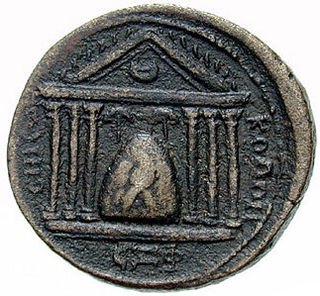 W
WCaracalla, formally known as Antoninus, was Roman emperor from 198 to 217. He was a member of the Severan dynasty, the elder son of Septimius Severus and Julia Domna. Co-ruler with his father from 198, he continued to rule with his brother Geta, emperor from 209, after their father's death in 211. His brother was murdered by the Praetorian Guard later that year, supposedly under orders from Caracalla himself, who then reigned afterwards as sole ruler of the Roman Empire. He found administration to be mundane, leaving those responsibilities to his mother, Julia Domna, to attend to. Caracalla's reign featured domestic instability and external invasions by the Germanic peoples.
 W
WElagabalus or Heliogabalus, officially known as Antoninus, was Roman emperor from 218 to 222. His short reign was conspicuous for sex scandals and religious controversy. He was cousin to the emperor Caracalla, and came from a prominent Arab family in Emesa (Homs), Syria, where in his early youth he served as head priest of the namesake sun god Elagabalus. After the death of Caracalla, Elagabalus was raised to the principate at 14 years of age in an army revolt instigated by his grandmother, Julia Maesa, against Caracalla's short-lived successor, Macrinus. As a private citizen, he was probably named Varius Avitus Bassianus. Upon becoming emperor he took the name Marcus Aurelius Antoninus, and became known after his native god only after his death.
 W
WEusebius of Caesarea, also known as Eusebius Pamphili, was a historian of Christianity, exegete, and Christian polemicist. He became the bishop of Caesarea Maritima about 314 AD. Together with Pamphilus, he was a scholar of the Biblical canon and is regarded as one of the most learned Christians of his time. He wrote Demonstrations of the Gospel, Preparations for the Gospel and On Discrepancies between the Gospels, studies of the Biblical text. As "Father of Church History", he produced the Ecclesiastical History, On the Life of Pamphilus, the Chronicle and On the Martyrs. He also produced a biographical work on Constantine the Great, the first Christian Emperor, who was augustus between 306 and 337 AD.
 W
WJulia Domna was Roman empress consort from 193 to 211. She was born in Emesa in Roman Syria to an Arab family of priests of the deity Elagabalus. In 187, she married Libyan-born Septimius Severus, who at the time was governor of the Roman province of Gallia Lugdunensis. They had two sons, Caracalla and Geta. A civil war over the Roman throne broke out in 193, and shortly afterwards Severus declared himself emperor. The war ended in 197 with the defeat of the last of Severus's opponents.
 W
WGaius Julius Bassianus or Bassus, also known as Julius Bassianus was an Arab high priest of Elagabalus at the Temple of the Sun in Emesa, Syria, where this solar deity was worshipped in a shape of a black stone. The name Elagabalus derives from Ilāh and gabal, resulting in "the God of the Mountain," the Emesene manifestation of the deity.. Bassianus was a member of the Royal family of Emesa, which was a part of the Arab aristocracy in this client kingdom of the Roman Empire. The beginning of his priesthood is unknown, but by 187 he was a high priest at Emesa. Bassianus was a son of a Julius and his paternal uncle was Julius Agrippa, who served as a Primipilaris.
 W
WCaius Julius Sampsiceramus, "from the Fabia tribe, also known as Seilas, son of Gaius Julius Alexion," was the builder of a mausoleum that formerly stood in the necropolis of Tell Abu Sabun, as recorded on an inscription said to have belonged to the monument. His relatedness to the Sampsigeramids has been deemed possible, probable, or has even been accepted, in which case through Gaius Julius Alexion.
 W
WMarcus Aurelius Severus Alexander was Roman emperor from 222 to 235, and the last from the Severan dynasty.
 W
WSeverus the Great of Antioch, also known as Severus of Gaza, was the Patriarch of Antioch, and head of the Syriac Orthodox Church, from 512 until his death in 538. He is venerated as a saint in the Oriental Orthodox Church, and his feast day is 8 February.
 W
WGaius Julius Sohaemus was a Roman client king of Armenia.
 W
WTheoclia was a Syrian Roman noblewoman.